Other Publications
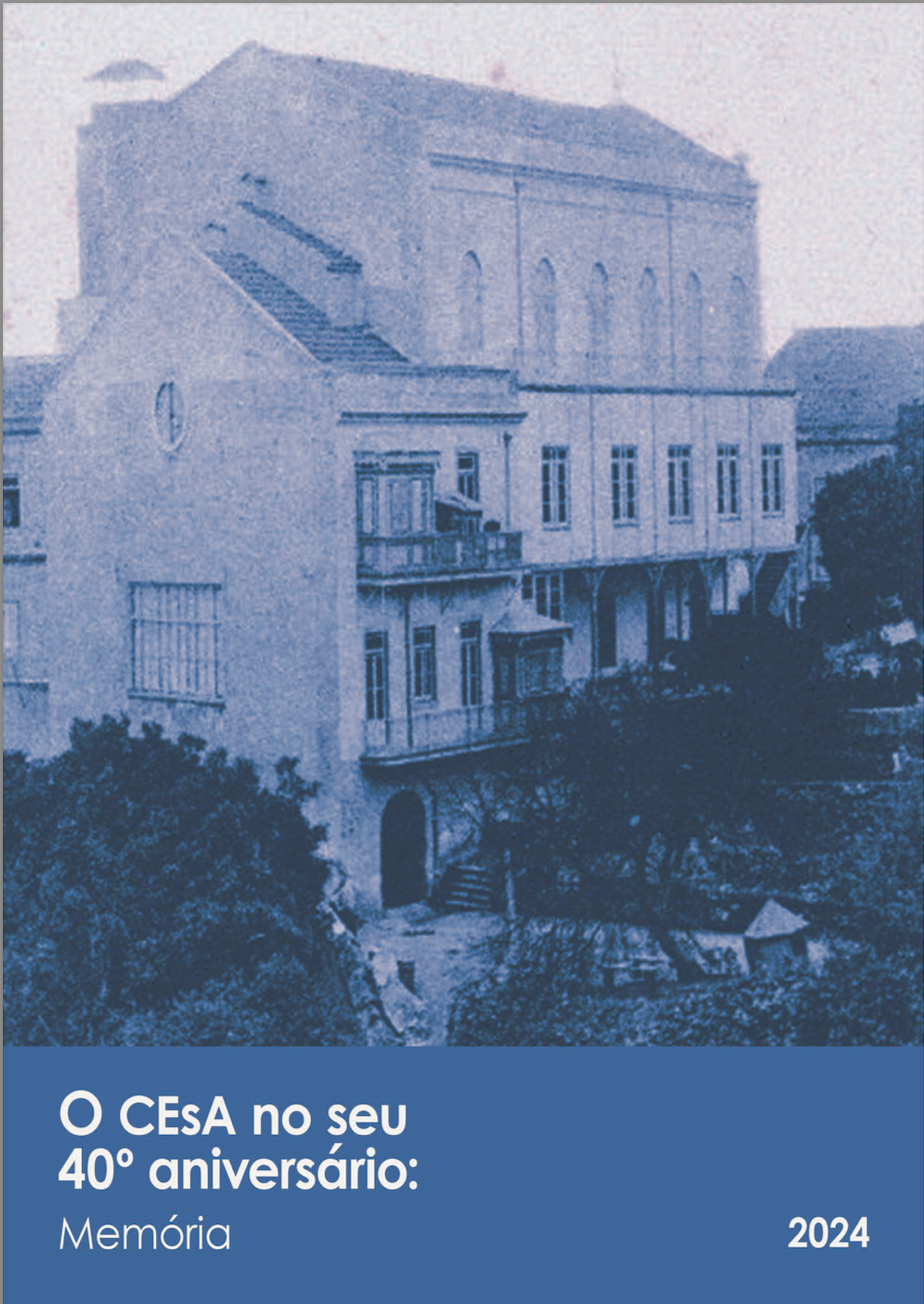
Brochure “O CEsA no seu 40º aniversário: Memória”
Abstract:
The Centre for African and Development Studies (CEsA) of the Lisbon School of Economics and Management, University of Lisbon (ISEG-ULisboa), is a research centre with its own legal personality, founded in 1983 by ISEG faculty members. It currently has two major research lines: 1) Economics, Development, and International Cooperation, and 2) History, Cultures, and Identities. The main funding institution for CEsA is the Foundation for Science and Technology (FCT). Over the years, entities such as the Portugal-Africa Foundation, the Calouste Gulbenkian Foundation, the Camões Institute, I.P., the Caixa Geral de Depósitos, ISEG, the European Union, the UNDP – United Nations Development Programme, among others, have supported various activities and projects. The geographical scope of this activity has mostly been Sub-Saharan Africa with historical ties to Portugal, while not neglecting Asia, particularly East Timor, and Brazil. The celebration of CEsA’s 40th anniversary and the 30th anniversary of the creation of the Master’s in Development and International Cooperation at ISEG offers us a unique opportunity to reflect on the trajectory and legacy in the field of research in Portugal.
Cite this Brochure:
CEsA (2024). “O CEsA no seu 40º Aniversário: Memória”. ISEG/CEsA – Centro de Estudos sobre África e Desenvolvimento.
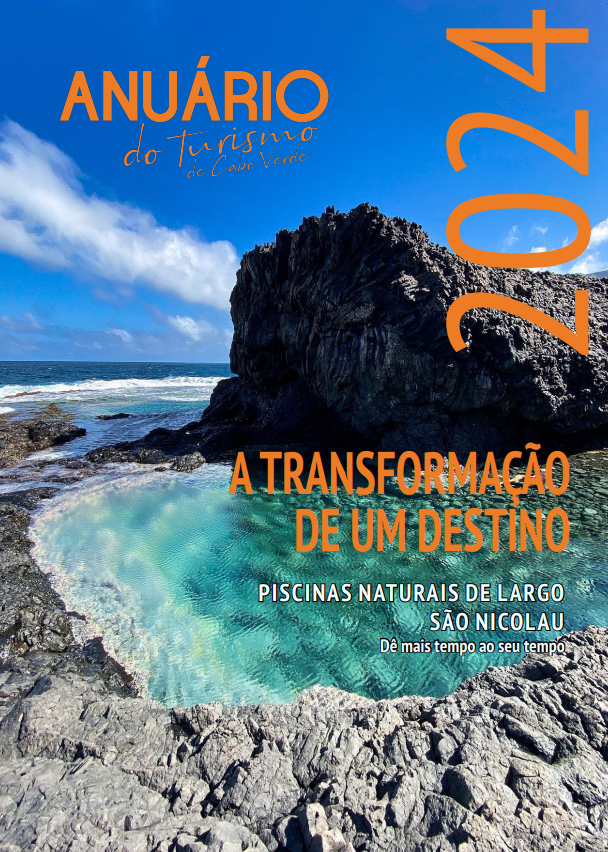
Turismo Costeiro e Marítimo em Cabo Verde. Rumo a um destino sustentável
Cite this paper:
Sarmento, E. (2024). Turismo costeiro e marítimo em Cabo Verde. Rumo a um destino sustentável. In Morgado, Carlos (2024). Anuário do Turismo de Cabo Verde 2024: a transformação de um destino (pp.30-32). Praia, Cabo Verde.
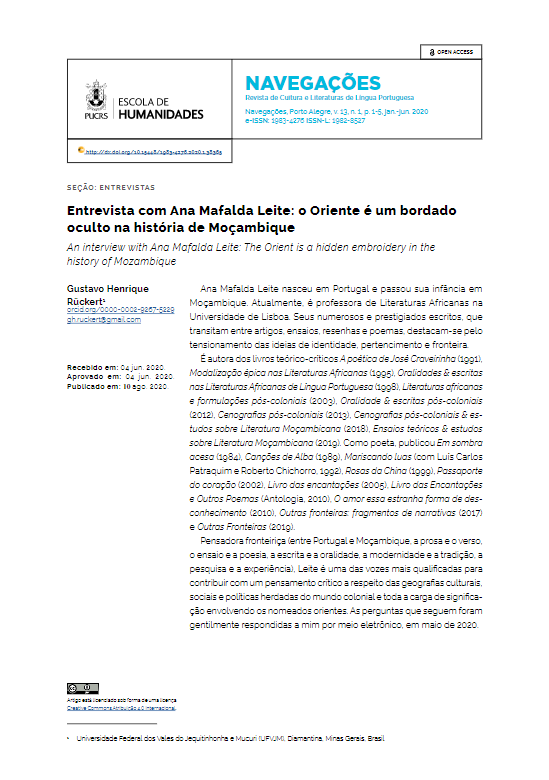
O Oriente é um bordado oculto na história de Moçambique: Entrevista com Ana Mafalda Leite
In this interview, Ana Mafalda Leite discusses the Indian Ocean and the East, as well as their meanings for Mozambican literature and for her poetic and academic trajectory.
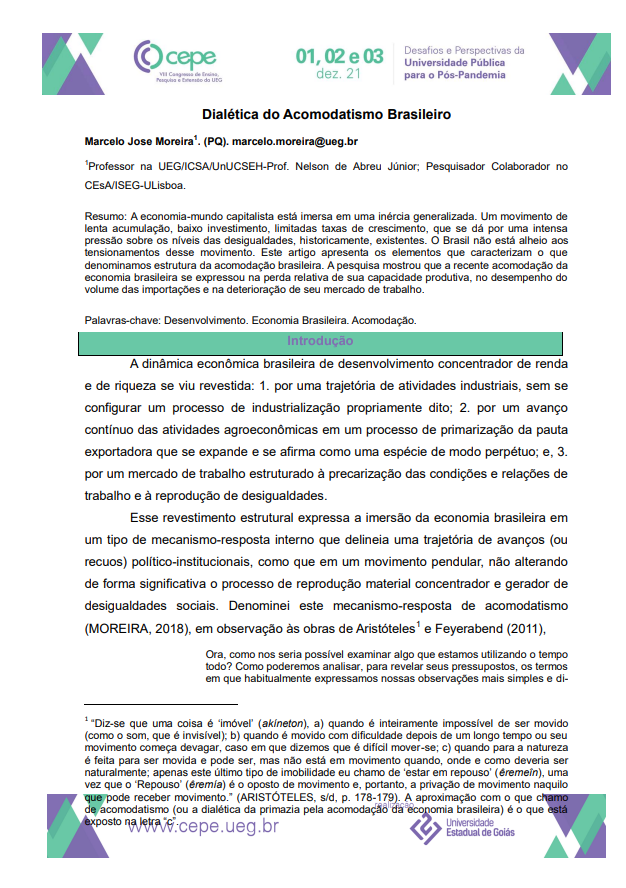
Dialética do Acomodatismo Brasileiro
Abstract:
The capitalist world-economy is immersed in a generalised inertia. A movement of slow accumulation, low investment, limited growth rates, which comes about through intense pressure on the levels of inequalities historically existing. Brazil is not alien to the tensions of this movement. Dialética do acomodatismo Brasileiro presents the elements that characterize what we call the structure of Brazilian accommodation. The research showed that the recent accommodation of the Brazilian economy was expressed in the relative loss of its productive capacity, in the performance of the volume of imports and in the deterioration of its labour market. The Brazilian economic dynamics of income and wealth concentrating development was covered by: 1. a trajectory of industrial activities, without setting up an industrialisation process as such; 2. a continuous advance of agro-economic activities in a process of primarisation of the export roster which expands and asserts itself as a kind of perpetual mode; and 3. a labour market structured towards precarious conditions and labour relations and the reproduction of inequalities. From the accommodationist perspective presented here, the IA-Br showed that the recent accommodation of the Brazilian economy was due to a significant performance of the external sector, to the relative but not significant loss of its productive capacity and to the upsurge of its labour market, which, added to the recent political-institutional alterations, characterise the Brazilian Accommodation Structure.
Quotation:
Moreira, Marcelo José (2021). “Dialética do acomodatismo Brasileiro”. Comunicação apresentada no VIII Congresso de Ensino, Pesquisa e Extensão da Universidade Estadual de Goiás (Cepe|UEG), Universidade Estadual de Goiás, Anápolis
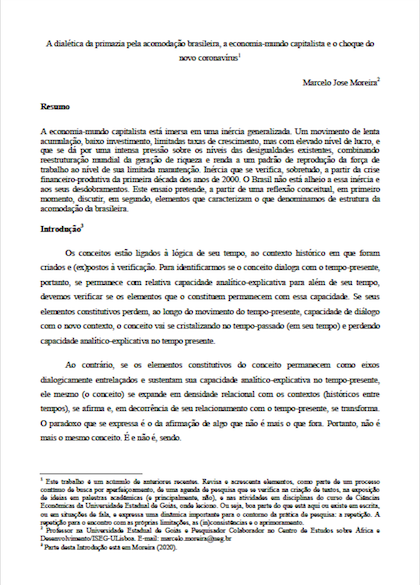
A dialética da primazia pela acomodação brasileira, a economia-mundo capitalista e o choque do novo coronavírus
A dialética da primazia pela acomodação brasileira, a economia-mundo capitalista e o choque do novo coronavírus by Marcelo José Moreira seeks to insert a conceptual proposal which, although initial and immersed in a reflection of an eminently analytical nature, suggests a way of abstracting how Brazilian underdevelopment-dependency is structured in the present-time, from an accommodationist perspective.
Abstract:
The capitalist world-economy is immersed in a generalized inertia. A movement of slow accumulation, low investment, limited growth rates, but with a high level of profit, and which is given by intense pressure on the levels of existing inequalities, combining a worldwide restructuring of wealth and income generation with a workforce pattern of reproduction to the level of its limited maintenance. Inertia that is verified, mainly, from the financial-productive crisis of the first decade of the 2000s. Brazil is not oblivious to this inertia and its consequences. This essay aims, from a conceptual reflection at first, to discuss, secondly, elements that characterize what we call the structure of Brazilian Accommodation.
Quotation:
Moreira, Marcelo José (2021). “A dialética da primazia pela acomodação brasileira, a economia-mundo capitalista e o choque do novo coronavírus”. Comunicação apresentada no 15º Colóquio Brasileiro em Economia Política dos Sistemas-Mundo: Pandemia e tendências seculares da economia-mundo capitalista , Florianópolis, Universidade Federal de Santa Catarina
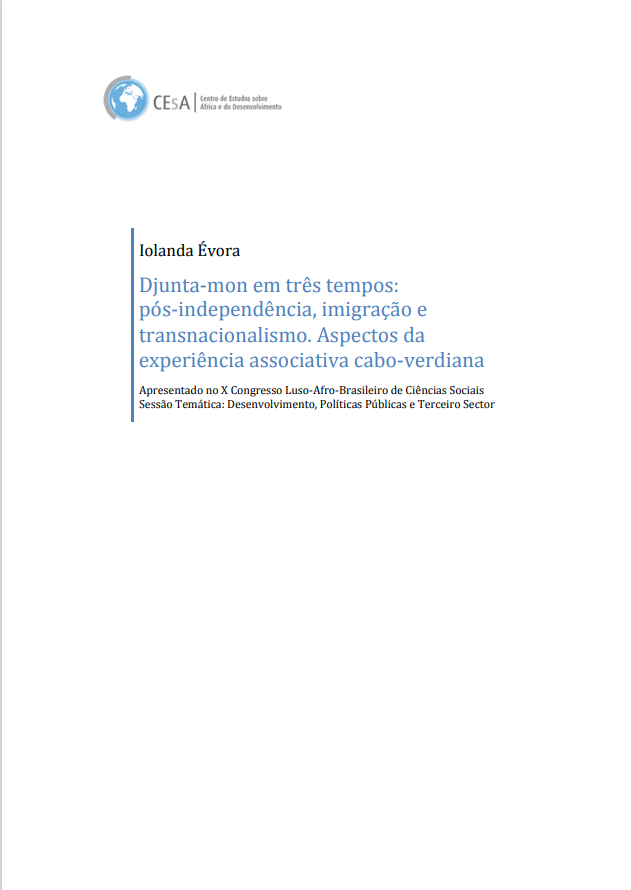
Djunta-mon em Três Tempos: Pós-independência, imigração e transnacionalismo. Aspectos da experiência associativa cabo-verdiana
Abstract:
Djunta-mon em três tempos: pós-independência, imigração e transnacionalismo. Aspectos da experiência associativa cabo-verdiana focuses on voluntary associations and discusses the material and psychosocial conditions of membership and participation of members. These aspects are analyzed from the point of view of the members of cooperatives in the rural area of the island of Santiago, created in the post-independence period, and of Cape Verdean immigrant associations in Portugal. In Santiago, we identified both singular forms of appropriation of the official ideological base and governmental objectives, as well as cultural permanences that, through practices such as djunta-mon, ensure the protection of social identities and allow familiarity and subjective control of this social practice. . In immigration, spontaneous associations propose to maintain identity, promote social inclusion or solve common problems and needs and reflect the heterogeneity, social cleavages and class divisions of origin that are reproduced in immigration. Currently, formal demands for greater rigor and technical and human competence in its functioning seem to weaken spontaneous and voluntary adhesion and the djunta-mon. At the same time, it questions the traditional role of these associations in the face of changes in immigration with the inclusion of new profiles such as transnational migrants. We examine the adaptability of this collective strategy, indicating that in the past, in the present and in the face of the possibility of a transnational associative practice, the use of the traditional djunta mon adapted to the lived context, ensures the maintenance of the strong network of reciprocity and sociability essential to survival and success. of the associations.
Quotation:
Évora, Iolanda. 2011. “Djunta-mon em três tempos: pós-independência, imigração e transnacionalismo. Aspectos da experiência associativa cabo-verdiana”. Comunicação apresentada no X Congresso Luso-Afro-Brasileiro de Ciências Sociais, Sessão Temática Desenvolvimento, Políticas Públicas e Terceiro Sector
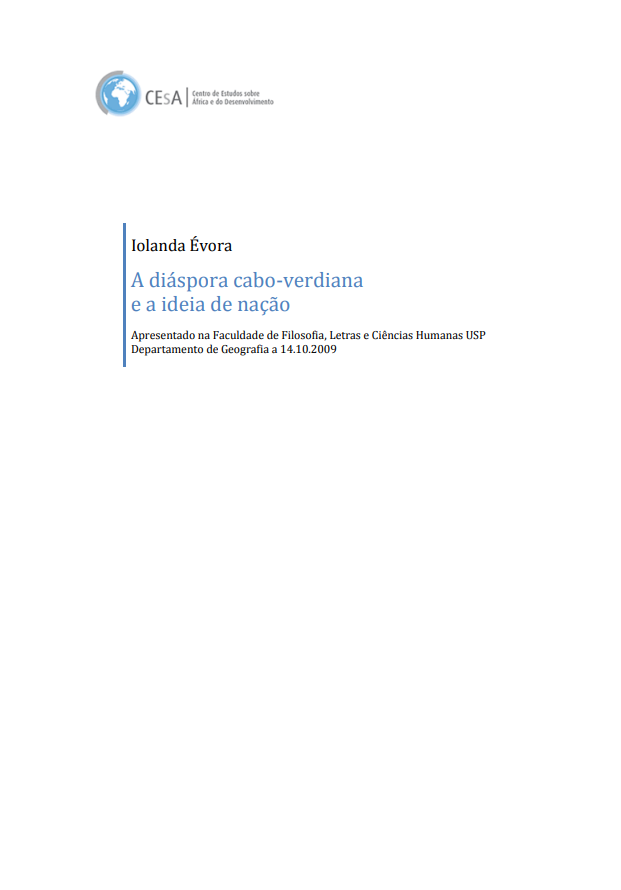
A Diáspora Cabo-verdiana e a Ideia de Nação
Abstract:
Starting from the notion of place as a horizon of connections, of productions of meanings and of struggles, the perspective we adopt highlights, on the one hand, a series of issues that have been little addressed, and, at the same time, shows its potential in the re-elaboration of the migratory phenomenon as a whole (which includes, for example, a psychosociology of the place of origin as a fundamental part of a diaspora nation as well). In addition to this interest from a social and academic place, there is no doubt that the topic “diaspora and nation”, when referred to Cape Verde, already arouses interest, that is, it is an impertinent (because provocative) subject, if we think about the mismatch between the geographical territoriality of the country (ten islands and 4033 km2 ) and the national (the islands and the diaspora). This means that it immediately indicates a challenge because geographical proximity is not adopted here as the criterion for defining a nation. On the contrary, in the case of Cape Verde, it is stated that the nation, in its definition, is only attainable if one also considers those who are physically distant from the territorial place called Cape Verde. A diáspora cabo-verdiana e a ideia de nação was delivered at the Faculdade de Filosofia, Letras e Ciências Humanas USP Departamento de Geografia on 14.10.2009.
Quotation:
Évora, Iolanda. 2011. “A diáspora cabo-verdiana e a ideia de nação”. Comunicação apresentada na Faculdade de Filosofia, Letras e Ciências Humanas, USP Departamento de Geografia, Brasil.
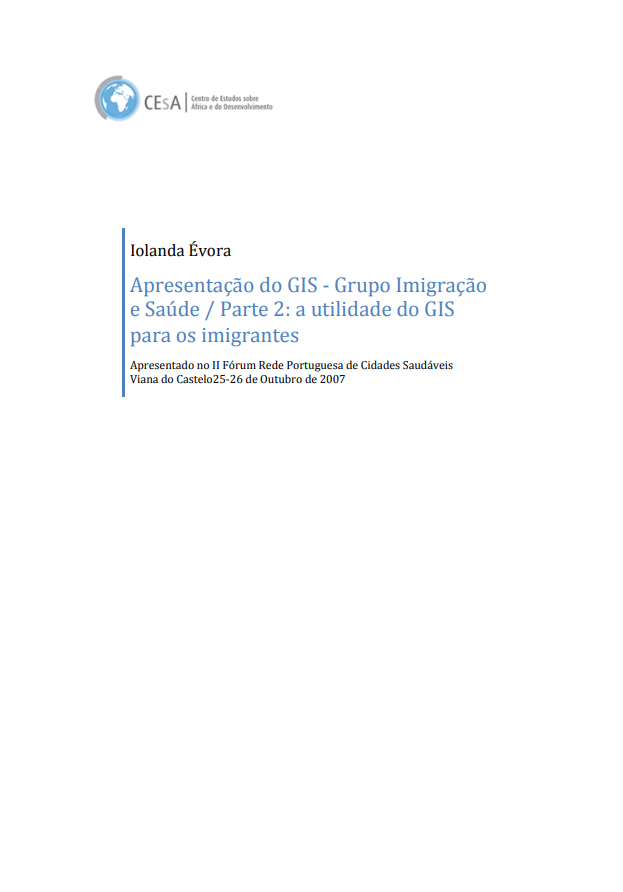
Apresentação do GIS – Grupo Imigração e Saúde Parte 2: A utilidade do GIS para os imigrantes
Abstract:
GIS (Immigration and Health Group) proposes the involvement (virtual and real) of people, public and private institutions which, by their professional activity, develop research projects and tasks related to the health of the immigrant population. At this moment, GIS is already a reference as a privileged and credible source of information on health/immigration initiatives. With its functioning model – decentralised action, provided by the network structure, in which initiatives are suggested by all – it has promoted an intense exchange, which in the field of immigration and health, is perhaps unprecedented in Portugal, if we think of the scale of its reach and the number of members of the group. This exchange is made between its members, whose actions may be academic or more practical, therefore, of intervention in the field. An analysis of the profile of the GIS members shows that a significant part of them deal with the immigration/health theme at both possible levels of action, either at the academic or practical level of intervention. Because of this profile, and because GIS promotes the meeting of people and their institutions at both levels, we can say that GIS is an important practical-reflective proposal, therefore, an important contribution to a more reflected intervention and a reflection closer to reality, when it comes to immigration/health. Apresentação do GIS – Grupo Imigração e Saúde Parte 2 : a utilidade do GIS para os imigrantes was given at the II Forum Portuguese Healthy Cities Network Viana do Castelo 25-26 October 2007.
Quotation:
Évora, Iolanda. 2011. “Apresentação do GIS – Grupo Imigração e Saúde Parte 2 : a utilidade do GIS para os imigrantes”. Comunicação apresentada no II Fórum Rede Portuguesa de Cidades Saudáveis, Viana do Castelo.
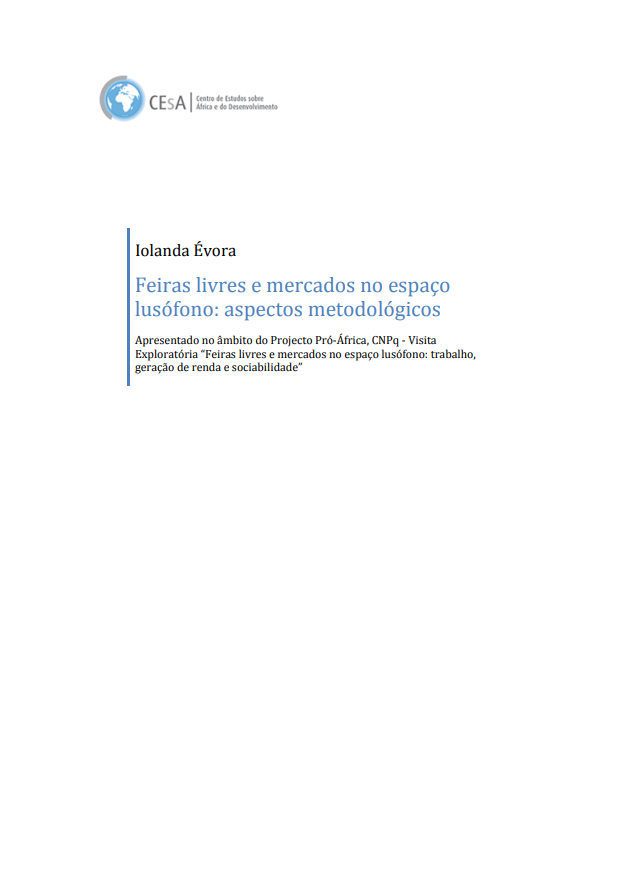
Feiras Livres e Mercados no Espaço Lusófono: Aspectos metodológicos
Abstract:
In Feiras livres e mercados no espaço lusófono: aspectos metodológicos the focus falls on aspects of the field of our research and we understand that a reflection on it is important due to: 1- specificities of our empirical object (the free fairs and markets that are work and economic activities present in urban centres in Brazil, Cape Verde and Guinea-Bissau; 2- our methodological options and ethical-political stance towards social reality and its actors; 3- the type of study we intend to carry out. Among the structuring axes of our research proposal we highlight that 1- we have the same set of concerns in relation to the different realities and contexts of study, that is, our focuses are: (a) the everyday processes that organize work in markets and free markets; (b) the conditions for the construction of a work base, that is, the set of knowledge, material resources and personal relationships that enables workers to generate income through work in micro-enterprises; 2- it is not intended to collect data for a comparison, but to ensure a cumulative knowledge, in which the realities of local fairs and markets, in each of the urban centres, are studied in their uniqueness and illuminate the understanding of the other contexts. This paper was presented at the Pro-Africa Project.
Quotation:
Évora, Iolanda. 2011. “Feiras livres e mercados no espaço lusófono: aspectos metodológicos”. Comunicação apresentada no âmbito do Projeto Pró-África, CNPq Visita Exploratória “Feiras livres e mercados no espaço lusófono: trabalho, geração de renda e sociabilidade.
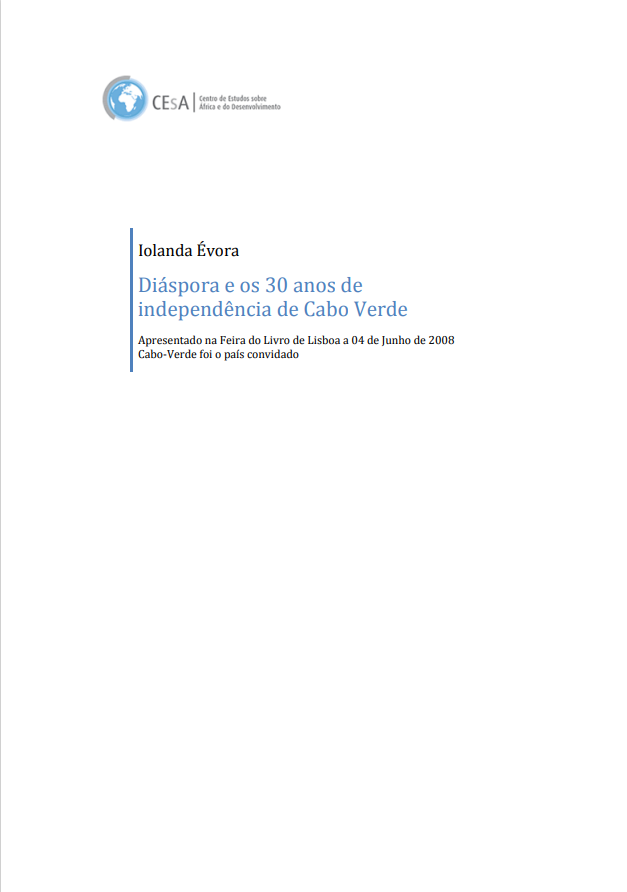
Diáspora e os 30 anos de independência de Cabo Verde
Abstract:
It would surprise most Cape Verdeans to know that what we live and designate as diaspora does not correspond to the most classical definitions about diaspora, which refer to secular migratory experiences that mobilise numerically significant populations and with a solid experience of exchange and mobility of long standing. But there are authors who argue that, for the term to be fruitful, it should be used in a neutral way and not be reserved only for certain populations whose social quality is ennobled: the exchange, in the case of traders, the intellectuals; the antiquity of the civilisation (in the case of the Greeks, Chinese or Indians) or the extent of the original catastrophe (in the case of the Jews, Armenians or Palestinians). These authors say that, in order to have value, it must be applied to all dispersed populations that maintain links, whatever their prestige. On the contrary, Cape Verdeans in general seem to have no doubt that we are a diaspora and it was during the last few years that the term has been consolidated among us and has come to define an important aspect of Cape Verdean society and sociability. Diaspora came to designate us as a historical collectivity which, with its dispersion in different political organisations (or because of this dispersion, in my opinion), maintains a reference to a collective identity and forms of solidarity among itself. Diáspora e os 30 anos de independência de Cabo Verde is a communication presented in Lisbon, 4th June 2008 Book Fair. Cape Verde was an invited country.
Quotation:
Évora, Iolanda. 2011. “Diáspora e os 30 anos de independência de Cabo Verde”. Comunicação apresentada na Feira do livro, Lisboa.





